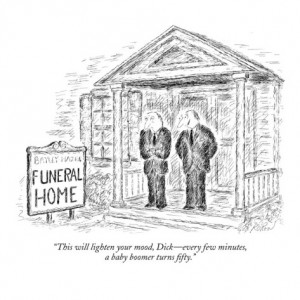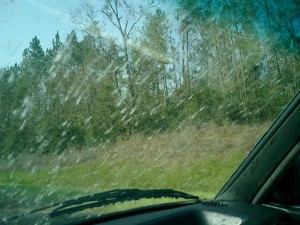====================
A sermon offered at the Funeral of Sheryl Ann King (12/14/1967-12/09/2015) on Monday, December 14, 2015, to the people of St. Paul’s Episcopal Church, Medina, Ohio, where Fr. Funston is rector.
(The lessons selected by the family were Isaiah 25:6-9 ; Psalm 121; Revelation 21:2-7; and John 14:23-30.)
====================
 A Native American proverb instructs us, “When you were born, you cried and the world rejoiced; live your life in a manner that when you die, the world cries and you rejoice.” Today, on what would have been Sheryl Ann King’s 48th birthday, the world (you and me and everyone who knew and loved Sherry) is crying, but Sherry is rejoicing. “If you loved me,” Jesus told his followers, “you would rejoice that I am going to the Father” (Jn 14:28); we who love Sherry, let us rejoice (even through our tears) that she, too, has gone to the Father.
A Native American proverb instructs us, “When you were born, you cried and the world rejoiced; live your life in a manner that when you die, the world cries and you rejoice.” Today, on what would have been Sheryl Ann King’s 48th birthday, the world (you and me and everyone who knew and loved Sherry) is crying, but Sherry is rejoicing. “If you loved me,” Jesus told his followers, “you would rejoice that I am going to the Father” (Jn 14:28); we who love Sherry, let us rejoice (even through our tears) that she, too, has gone to the Father.
In the Jewish religion going back at least as far as the Babylonian exile it is a tradition that those mourning the death of a loved one recite a prayer called the Mourner’s Kaddish. The prayer begins with these words:
Exalted and hallowed be God’s great name in the world which God created, according to plan. May God’s majesty be revealed in the days of our lifetime and the life of all Israel – speedily, imminently, to which we say Amen. (ReformJudaism.org>
As the prayer continues to its conclusion, there is not a single mention of the loved one, no mention of the loved one’s passing, no mention of the mourner’s grief. The prayer is, in its entirety, a sanctification of God and a petition for peace. The rabbis tell us that this tradition arose to remind us, even in the midst of great sorrow, to rejoice and to give thanks.
Nonetheless, there is a very human need to acknowledge the loss of the one we love and in a prayer book of the Reform Jewish movement entitled New Prayers for the High Holy Days there is this lovely meditation:
At the rising sun and at its going down, we remember them.
At the blowing of the wind and in the chill of winter, we remember them.
At the opening of the buds and in the rebirth of spring, we remember them.
At the blueness of the skies and in the warmth of summer, we remember them.
At the rustling of the leaves and in the beauty of the autumn, we remember them.
At the beginning of the year and when it ends, we remember them.
As long as we live, they too will live,
for they are now a part of us.
As we remember them.
When we are weary and in need of strength, we remember them.
When we are lost and sick at heart, we remember them.
When we have decisions that are difficult to make, we remember them.
When we have joy we crave to share, we remember them.
When we have achievements that are based on theirs, we remember them.
For as long as we live, they too will live,
For they are now a part of us, as we remember them.
(Sylvan Kamens & Rabbi Jack Riemer, We Remember Them, New Prayers for the High Holy Days, Media Judaica, New York:1970, p. 36)
What memories do you have of Sherry? I will always remember three things about her. The first is her competence and her drive. When Sherry was doing volunteer work here at St. Paul’s Church, I knew that if she said she would do something it would get done and it would get done well. (Parish priests really appreciate that and remember with special blessings those members on whom they can rely as one could rely on Sherry.) The second is that she loved to have a good time: she was a great hostess and she enjoyed a good party. I’m sure that she is just as pleased as she can be to be joining the saints in light at God’s great party, the one Isaiah described, that “feast of rich food, . . . of well-aged wines, of rich food filled with marrow, of well-aged wines strained clear” (Is 25:6).
The third thing I will remember is the way she always looked when she came back from her annual trip to Cancun. Sherry was someone who clearly enjoyed the sun! I have to admit to being somewhat amused when I realized that the family had selected a psalm with the verse, “The sun shall not strike you by day” (Ps 121:6)! I’m not sure Sherry would have gone for that, but I am sure she is now enjoying what Malachi prophesied, “For you who revere my name the sun of righteousness shall rise, with healing in its wings. You shall go out leaping like calves from the stall.” (Mal 4:2) Sherry, we believe, is now in that place “where sorrow and pain are no more, neither sighing, but life everlasting.” (BCP 1979, p 499)
And this is where our Christian faith takes us beyond the meditation in the Reform Jewish prayer book. We are assured that more than our memories sustains the lives of our departed loved ones; it is not “as long as we live” that they shall live, but forever. We are assured, because of the birth of Christ which we will celebrate in just a few days, because of his life, his death, his resurrection, and his ascension, that the way to eternal life has been opened to Sherry, to all of our loved ones gone before, and to all of us.
Sometimes when we bury the dead, we also celebrate the Holy Communion. In the Episcopal Church as part of that service, in the introductory preface to the consecration of the bread and wine, the priest presiding at the altar says these words:
Jesus Christ our Lord . . . rose victorious from the dead, and comforts us with the blessed hope of everlasting life. For to your faithful people, O Lord, life is changed, not ended; and when our mortal body lies in death, there is prepared for us a dwelling place eternal in the heavens. (BCP 1979, p 382)
This is our Christian hope and our assurance, that in Christ Jesus God has (as Isaiah prophesied) “swallow[ed] up death forever” (Is 25:8), and as John of Patmos heard the voice in heaven saying, “Death will be no more; mourning and crying and pain will be no more, for the first things have passed away.” (Rev 21:4)
So, our memories are precious and we cherish them, but it is more than our memories which sustain Sherry or any of our departed loved ones: through the love of God and the salvation of Christ, rest eternal has been granted to them, and light perpetual shines upon them. And we honor them with more than our memories; we honor Sherry not by living in the past, not only by remembering her, but by living into the future. When Queen Mother Elizabeth passed away in 2002, this meditation entitled Remember Me by David Harkins was included in the order of service. It seems to me appropriate today as we remember and celebrate Sherry’s life:
Do not shed tears when I have gone
but smile instead because I have lived.
Do not shut your eyes and pray to God that I’ll come back,
but open your eyes and see all that I have left behind.
I know your heart will be empty because you cannot see me,
but still I want you to be full of the love we shared.
You can turn your back on tomorrow
and live only for yesterday,
or you can be happy for tomorrow
because of what happened between us yesterday.
You can remember me and grieve that I have gone
or you can cherish my memory and let it live on.
You can cry and lose yourself,
become distraught and turn your back on the world,
or you can do what I want –
smile, wipe away the tears,
learn to love again and go on.
(See Poetic Expressions.)
The French novelist Marcel Proust once wrote, “Let us be grateful to people who make us happy; they are the charming gardeners who make our souls blossom.” (Pleasures and Days, Hesperus Classics, London:2004, p 116) “Do not let your hearts be troubled,” said Jesus, “and do not let them be afraid.” (Jn 14:27c) Instead, let them blossom, and let us rejoice and be grateful for the life of Sheryl Ann King. Amen.
====================
A request to my readers: I’m trying to build the readership of this blog and I’d very much appreciate your help in doing so. If you find something here that is of value, please share it with others. If you are on Facebook, “like” the posts on your page so others can see them. If you are following me on Twitter, please “retweet” the notices of these meditations. If you have a blog of your own, please include mine in your links (a favor I will gladly reciprocate). Many thanks!
====================
Father Funston is the rector of St. Paul’s Episcopal Church, Medina, Ohio.
 The death of anyone important in our lives is a tragic and painful thing, even if the relationship was strained or even broken. This is especially so when a parent dies and, for some reason, more so when that parent is our father, perhaps because we use that metaphor of fatherhood to explain God’s relationship to us. Whenever someone’s father passes away, I cannot help but remember the poem by the Welsh poet Dylan Thomas, Do Not Go Gentle Into That Good Night:
The death of anyone important in our lives is a tragic and painful thing, even if the relationship was strained or even broken. This is especially so when a parent dies and, for some reason, more so when that parent is our father, perhaps because we use that metaphor of fatherhood to explain God’s relationship to us. Whenever someone’s father passes away, I cannot help but remember the poem by the Welsh poet Dylan Thomas, Do Not Go Gentle Into That Good Night: Until our twenty-fifth wedding anniversary my wife had never traveled overseas. She’d been to Canada, but that was it for foreign travel for her. For our anniversary we went to Ireland, something we’d talked about doing for many years. In fact, it had been my plan for our honeymoon, but that (obviously) didn’t happen.
Until our twenty-fifth wedding anniversary my wife had never traveled overseas. She’d been to Canada, but that was it for foreign travel for her. For our anniversary we went to Ireland, something we’d talked about doing for many years. In fact, it had been my plan for our honeymoon, but that (obviously) didn’t happen.  The Book of Common Prayer (1979) lifts these verses and, together with others, uses them in the anthem with which the Burial Office (Rite Two) begins:
The Book of Common Prayer (1979) lifts these verses and, together with others, uses them in the anthem with which the Burial Office (Rite Two) begins: My stepfather was a good man with faults. That is probably a description that could apply to millions of people, probably most people — good with faults. Whether he would be classed by Qoheleth as “righteous” or as “wicked” — or perhaps somewhere in between — I have no idea. What I do know is that he enjoyed himself.
My stepfather was a good man with faults. That is probably a description that could apply to millions of people, probably most people — good with faults. Whether he would be classed by Qoheleth as “righteous” or as “wicked” — or perhaps somewhere in between — I have no idea. What I do know is that he enjoyed himself.  Here is another piece of Paul’s writing that the Episcopal Church has lifted out of the bible and plugged into The Book of Common Prayer. It is used as the opening dialog of the church’ baptismal service. After a seasonally appropriate greeting, the presider and people converse:
Here is another piece of Paul’s writing that the Episcopal Church has lifted out of the bible and plugged into The Book of Common Prayer. It is used as the opening dialog of the church’ baptismal service. After a seasonally appropriate greeting, the presider and people converse: I seem to recall from studying Genesis each time I have had to preach on it that this purchase of the cave at Machpelah has been a subject of much rabbinic speculation over the centuries. Why, the rabbis seem to wonder, is Abraham willing to pay what is clearly an exorbitant price for the cave and the field (a field he doesn’t even actually want)?
I seem to recall from studying Genesis each time I have had to preach on it that this purchase of the cave at Machpelah has been a subject of much rabbinic speculation over the centuries. Why, the rabbis seem to wonder, is Abraham willing to pay what is clearly an exorbitant price for the cave and the field (a field he doesn’t even actually want)?  Today is the first Sunday in November which means that instead of the normal sequence of lessons for Ordinary Time, we are given the option of reading the lessons for All Saints Day, which falls every year on November 1. So today we heard a very strange reading from the Book of Daniel, a to-my-ear very troubling gradual psalm (in which we sing of wreaking vengeance on the nations and punishment on the peoples, of binding king in chains, and of inflicting judgment on the nobles bound in iron), a bit of Paul’s letter to the Church in Ephesus extolling the riches of the inheritance of the saints, and to Luke’s version of the Beatitudes in which Jesus not only blesses the poor, the hungry, and the weeping, he sighs woefully over the future plight people like ourselves – the comparatively wealthy, those whose bellies are full, and those in relatively good state of mind.
Today is the first Sunday in November which means that instead of the normal sequence of lessons for Ordinary Time, we are given the option of reading the lessons for All Saints Day, which falls every year on November 1. So today we heard a very strange reading from the Book of Daniel, a to-my-ear very troubling gradual psalm (in which we sing of wreaking vengeance on the nations and punishment on the peoples, of binding king in chains, and of inflicting judgment on the nobles bound in iron), a bit of Paul’s letter to the Church in Ephesus extolling the riches of the inheritance of the saints, and to Luke’s version of the Beatitudes in which Jesus not only blesses the poor, the hungry, and the weeping, he sighs woefully over the future plight people like ourselves – the comparatively wealthy, those whose bellies are full, and those in relatively good state of mind. The saints whom we celebrate on this day (and the many who are given special days of individual recognition) were people who tried to live according to the Bible as they understood its teachings. Like us, they read it and encountered those troubling visions, those petulant patriarchs, those bloodthirsty psalms, and somehow looked past them and through them to see the God of faith, the God who Incarnate in Jesus said, “Love your enemies, do good to those who hate you, bless those who curse you, pray for those who abuse you.” We extoll the virtues of those saint and we celebrate their lives and their witness because they help us to do the same. By their lives and their examples, they clean the windshield for us; they clean away the bug blood and the mud, so that we no longer focus on the window, but on the God the window shows us.
The saints whom we celebrate on this day (and the many who are given special days of individual recognition) were people who tried to live according to the Bible as they understood its teachings. Like us, they read it and encountered those troubling visions, those petulant patriarchs, those bloodthirsty psalms, and somehow looked past them and through them to see the God of faith, the God who Incarnate in Jesus said, “Love your enemies, do good to those who hate you, bless those who curse you, pray for those who abuse you.” We extoll the virtues of those saint and we celebrate their lives and their witness because they help us to do the same. By their lives and their examples, they clean the windshield for us; they clean away the bug blood and the mud, so that we no longer focus on the window, but on the God the window shows us. Are you familiar with those visions of the afterlife in which the dearly departed, clothed in flowing white robes lounge around on fluffy, white cotton clouds playing harps? I have to be honest with you that I cherish a very dear hope that such visions are 100% absolutely wrong! I cannot imagine any existence more boring than an eternity of cloud-floating and harp-playing, and if my ten years of knowing Charlie Stehno have given me a clue of anything about Charlie it is that he would most likely feel the same way. If he has gotten to the Great Hereafter only to find himself fitted out with a flowing white robe and issued a harp to play and cloud to lounge upon, I suspect that he is (as my grandmother would say) “fit to be tied.”
Are you familiar with those visions of the afterlife in which the dearly departed, clothed in flowing white robes lounge around on fluffy, white cotton clouds playing harps? I have to be honest with you that I cherish a very dear hope that such visions are 100% absolutely wrong! I cannot imagine any existence more boring than an eternity of cloud-floating and harp-playing, and if my ten years of knowing Charlie Stehno have given me a clue of anything about Charlie it is that he would most likely feel the same way. If he has gotten to the Great Hereafter only to find himself fitted out with a flowing white robe and issued a harp to play and cloud to lounge upon, I suspect that he is (as my grandmother would say) “fit to be tied.”

